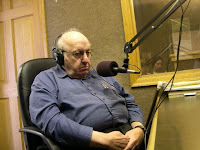I've been obsessed with radio since I was a kid. Talk radio, especially. I love the carny-type barking that goes into baiting callers, listening to people who hold opinions so strongly that they believe them to be fact and the pomp-and-circumstance that comes with producing shows in a way that attracts people to listen on a daily basis. I just love the culture of talk radio.
Mostly, though, I love being on talk radio. Thanks to my friend Jackie, who's blog is called Saved By the Torso
Thanks to my friend Jackie, who's blog is called Saved By the Torso,
we had the chance to visit the Jerry Waters Show during the Friday broadcast. Jackie and I met for coffee that morning, and sort of dismissed the notion that Jerry would have us on-air for any real length of time. Get a polite introduction, then stick around and watch the show being produced. That itself would be wonderful; anything more would be gravy. Sure, Waters invited us to participate, but clearly a guy running his own show would have too large an ego to let a couple of goofs named The Film Geek and Jackie Lantern be a big part of the goings-on. Jerry, as it turns out, doesn't have that big an ego. He's a regular guy, who seems to enjoy talking to other regular guys. And when regular guys weren't available, he didn't mind talking to Jackie and me.
Not only did we discuss blogging (during which we unabashedly plugged The Hot Dog Blog) local bloggers (I tried to cozy up to fellow progressive Raging Red so that she's add me back to her blogroll) and politics (why didn't someone tell me Waters' audience is made up of neo-cons!?!), Waters invited us to weigh in on other topics he discussed during the show.
 Waters' co-host, Pete Thaw, didn't know what "blogging" was. This picture was snapped soon after Jackie explained to him the concept, beginning with technology for which Pete had reference:
Waters' co-host, Pete Thaw, didn't know what "blogging" was. This picture was snapped soon after Jackie explained to him the concept, beginning with technology for which Pete had reference:
Jackie: "Well, Pete, imagine an abacus..."
In this picture (courtesy of Jackie) Pete is contemplating.
Charles live-blogged the event, and posted it on his site The Charlestonian.
Scarlet emailed her well wishes, and chided Jerry for being too negative!
Having morning coffee with Jackie and being on the Jerry Waters Show already made for a terrific day. Friday got even better, though, when Stanton invited us to lunch at Chris', and then picked up the tab. Jerry, his friend Dick and Jerry's sometimes-co-host and producer Andy Albertini tagged along.
Great hot dogs, great conversation and friendly folks. All at a great price!
Free!!
 Boiled down, those three reasons equal this:
Boiled down, those three reasons equal this: 


























